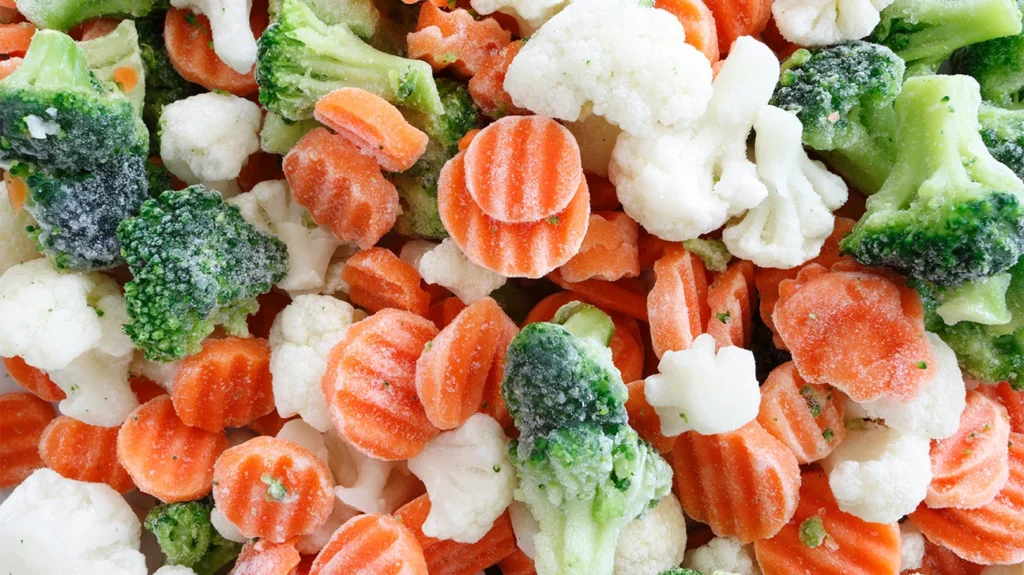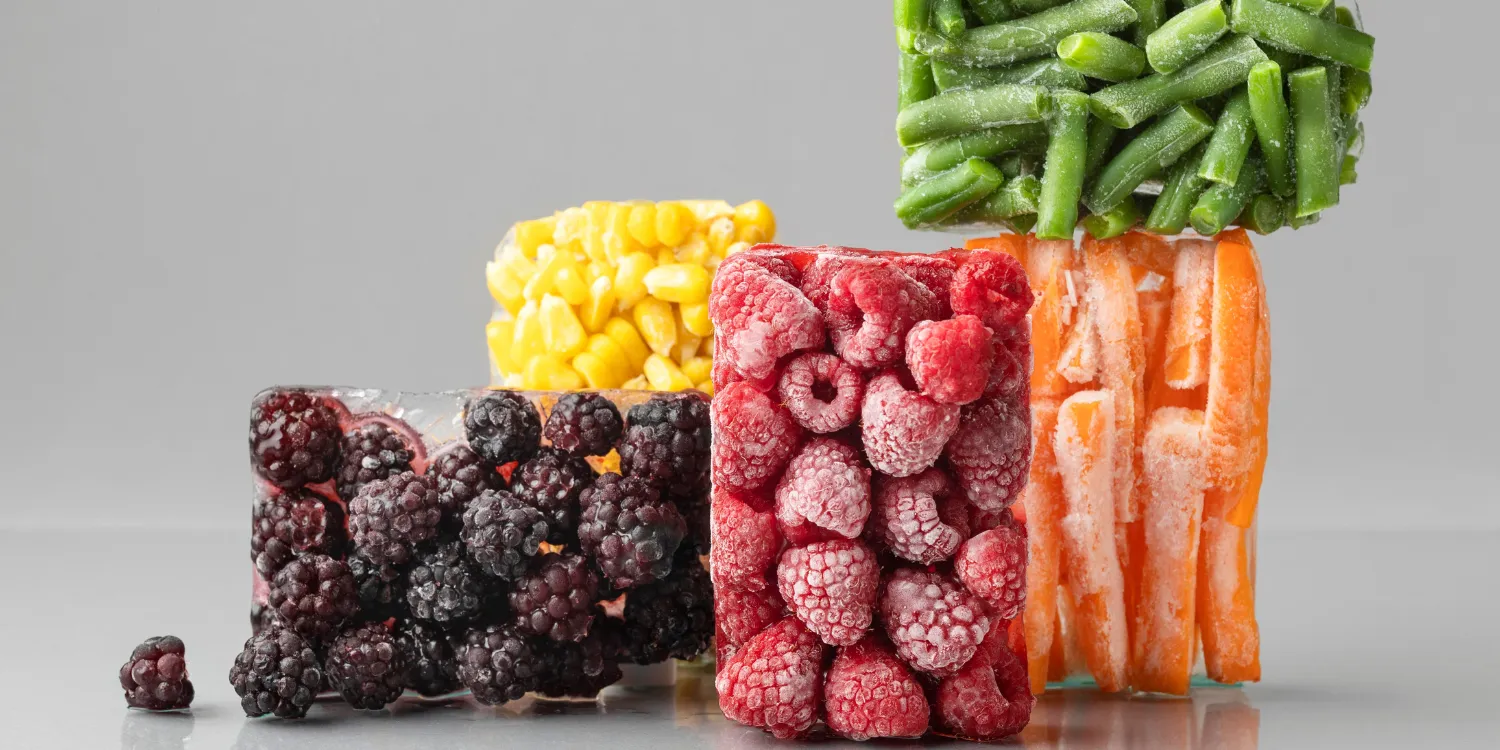Many believe that frozen vegetables lack the nutritional value of fresh ones, but the truth is that both can contain the same levels of vitamins and minerals.Further, only one in ten US adults consumes the recommended amounts of fruits and vegetables, so nutritionists encourage eating these foods in whatever form possible.
Freezer vegetables in these grocery stores are mainly nutrient-dense, including peas, broccoli florets, corn, and carrots. Such pre-cut vegetables include the ease of preparation, longer shelf life, plus a reduced price most often compared to fresh produce.
“Frozen and fresh vegetables are equally as nutritious,” explains Michael Laguros, MS, RD, extension program specialist with Texas A&M AgriLife Extension Service. “The deciding factor should be based on things such as cost, convenience, and personal preference, with the take-home point being to consume more vegetables in general.”
Health Benefits of Frozen Vegetables Vegetables are good sources of fiber, potassium, and vitamins A and C, considered to be effective preventive agents for heart disease and cancer.3 Frozen vegetables sold commercially are harvested at peak maturity, quickly blanched, and then frozen to maintain their nutritional value.4
“Most frozen vegetables are blanched— either in boiling water or steam— to stop an enzyme activity that would otherwise cause the product to deteriorate during freezer storage,” said Carolyn Slupsky, PhD, a professor at the University of California, Davis.READ ALSO : Researchers Discover the Earliest Biological Indicators of Autism
A significant reason to blanch is the destruction of bacteria and inactivation of enzymes that would otherwise negatively impact nutritional value as well as changes in textural and flavor. The veggies are then rapidly cooled in an ice water bath, dried, and frozen “5
Picking the Healthiest Vegetables: Here’s the best news so far: according to Slupsky, researchers establish the best blanching times for many kinds of vegetables to ensure that the smallest amount of nutrients and enzymes are lost before the vegetables’ desired raw characteristics are maintained. For instance, while cauliflower florets should be cooked in boiling water for three minutes, onion rings need only 10 to 15 seconds of exposure.
“Although fresh-picked vegetables might present optimum nutrition, really there isn’t that much nutrient loss in most frozen vegetables after they’ve been processed,” Slupsky assured.
Decoding Processed Frozen Vegetables One of the most common concerns around processed foods involves the health properties of frozen vegetables. In fact, Sara Elnakib, PhD, MPH, RDN, an associate professor at Rutgers University, says all foods are processed in some way unless consumed raw.
“Ultra-processed foods, which come with additives such as colors and sweeteners, have been associated with various health risks, including cancer and heart disease,” explained Elnakib. “In contrast, frozen vegetables are minimally processed, with a focus on only the inedible parts and preservation techniques that don’t bring further health risks of their own.”
Elnakib further described, “Freezing vegetables can retain their nutritional quality by preserving them from natural decomposition processes, which result in losses of water-soluble vitamins, such as C and B Complex, which are generally sensitive to heat and oxygen”.
Selecting and Freezing Vegetables Note that freezing vegetables preserves nutritional values, lost as soon as the fresh vegetable is harvested. So whereas most of the developed freezing process occurs in people’s homes, the process of freezing must start with customers when produce is purchased or picked—not when it is resurrected from an older, spoiled state.
Read Also : Contemporary Strategies in the Treatment of Opioid Addiction within Healthcare Organizations
Kelly Kunkel, MS, health and nutrition educator at the University of Minnesota Extension, said starting with fresh, ripened product was one of the critical pieces to freezing quality. “Freezing won’t preserve a spoiled product; the vegetables need to be ones you would eat fresh.” Whether freezing at home or buying frozen vegetables, check packages for ice crystals, which is an indication of improper handling or changes in freezer temperature.
“Freeze-thaw cycles can result in quality and nutritional loss of the product during freezing, which affects the texture and nutrients,” explained Kumar Mallikarjunan, PhD, a professor at the University of Minnesota specializing in food science.
Frozen vegetables will usually maintain quality for eight to twelve months if stored at 0 degrees Fahrenheit or lower, if they are handled and stored properly.8 Proper blanching, freezing, and storage techniques assure the best nutritional quality, generally better than other preservation methods.
Both fresh and frozen vegetables offer essential vitamins, minerals, and fibrous elements that are crucial in building a proper and healthful diet. Although many arguments are made from one side to the other that one is more nutritious, concerns with fresh vegetables seem to come from the side that they are eaten closer to their harvest time, hence supposedly maintaining higher amounts of specific nutrients. This view tends to forget the process of freezing of vegetables at just the right moment.
It provides evidence that freezing of vegetables, soon after harvesting, retains their components very well. The process involves blanching, which exposes the vegetables briefly to boiling water vapor after which it consequently inactivates enzymatic action to maintain color, texture, and nutrients in the vegetables. The items are then promptly cooled to avoid overcooking and packed into a freezer to maintain the freshness of these vegetables until the consumer eats them.
UC Davis nutrition and food science expert Dr. Carolyn Slupsky said, “Blanched frozen vegetables are important not only to prevent degradation by enzymes but also for both the safety and quality of the frozen vegetables. It makes them safe for consumption while they can retain most of the essential nutrients.”
This places frozen vegetables at a further convenient level beyond preservation. Being pre-cut and pre-packed, they, in essence, reduce preparation time and fight off as much food wastage possible, therefore making them accessible and most convenient for the busy person or family that wants to include much more vegetables in their daily intake.
Introduction Vegetables, in their travel from the farm to the table, have to suffer nutrient degradation due to light, air, and temperature changes. Fresh produce starts losing its inherent nutrient content immediately it is harvested, while freezing is able to halt the process, thus effectively preserving heat and oxygen-sensitive nutrients such as vitamins C and B complex.
Sara Elnakib agrees and further explains, “Freezing of vegetables retains natural nutritive factors, which would be lost with time in fresh ones. In fact, it is a method that protects very well the input of especially waters soluble vitamins, which have a great significance in vital activities.”

Still, the misconception that the nutritive quality of frozen vegetables is low seldom considers their contribution to dietary diversity and overall consumption of vegetables. For most consumers, frozen vegetables provide a viable alternative when fresh options are unavailable or when they can’t afford fresh vegetables. They can help bridge nutritional gaps in the diet.
Allaying Fears about Processed Foods The word “processed” may bring itself to mind elements of poorer quality food, with all the associated implications for health. Central, however, is the definition of processing: while ultra-processed foods undergo extensive industrial processing and sometimes contain additives known to have deleterious health effects, minimally processed frozen vegetables are defined as maintaining natural goodness with no loss also in nutritional value.
Kelly Kunkel is a nutrition educator for the University of Minnesota Extension. She said, “When choosing frozen vegetables, look for products with few additives and limited processing, to maintain the natural nutrition qualities of vegetables but allow a quick and extended shelf life.”
Include in the Discussion ‘Practical Tips for Buying and Storing Frozen Vegetables. When purchasing frozen vegetables one should look for those without added sauces, salt, or sugar. Those added ingredients will do nothing except add both extra calories and sodium to their diet, eliminating the nutritional value they can get from vegetables ‘.
Kumar Mallikarjunan, a food science professor at the University of Minnesota, answered the question about best practices with this: “Maintaining a constant freezer temperature at 0 degrees Fahrenheit or below will help in preserving quality and nutrients in frozen vegetables. Preventing freeze-thaw cycles helps to maintain texture and prevent loss of nutrients.”
If you are going to freeze vegetables from your home, then freeze best-quality, fresh produce. Time-table recommendations for each type of vegetable should be used to help the most nutrition and to retain flavor. The right packaging with the proper seal — in a container or vacuum-sealed bag — will keep air and moisture out and, thus, keep freshness in.
Conclusion The argument between fresh vegetables and this vegetable question gives reasons why each variety adds value to the human diet. While there is an advantage to the fresh vegetable being consumed right away and probably containing a higher nutrient value at the start, the frozen vegetables are practical, food-value-dense, and extend shelf life, minimizing food spoilage.
Frozen vegetables are of high quality, through proper storage know-how it’s possible to enjoy vegetables in many daily meals conveniently and in a healthy recommended way. With the mindset, one shall go for fresh or frozen in such a way that it varies, the servings are moderate, and the diet is a balanced one for health as far as one’s life is concerned.

